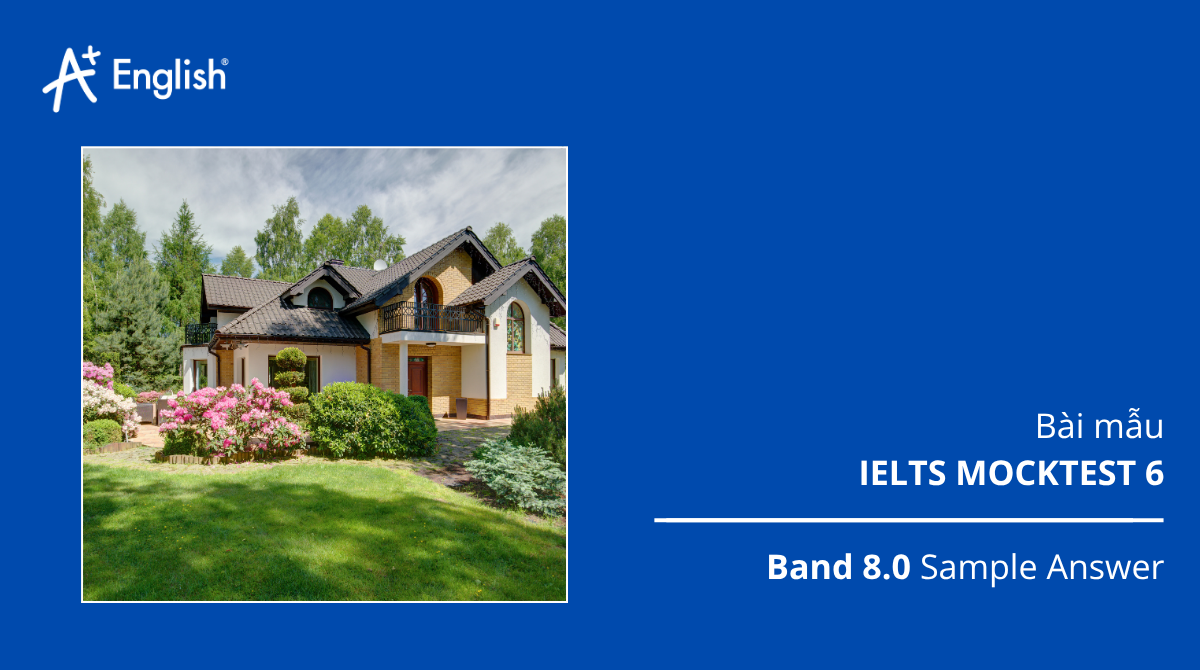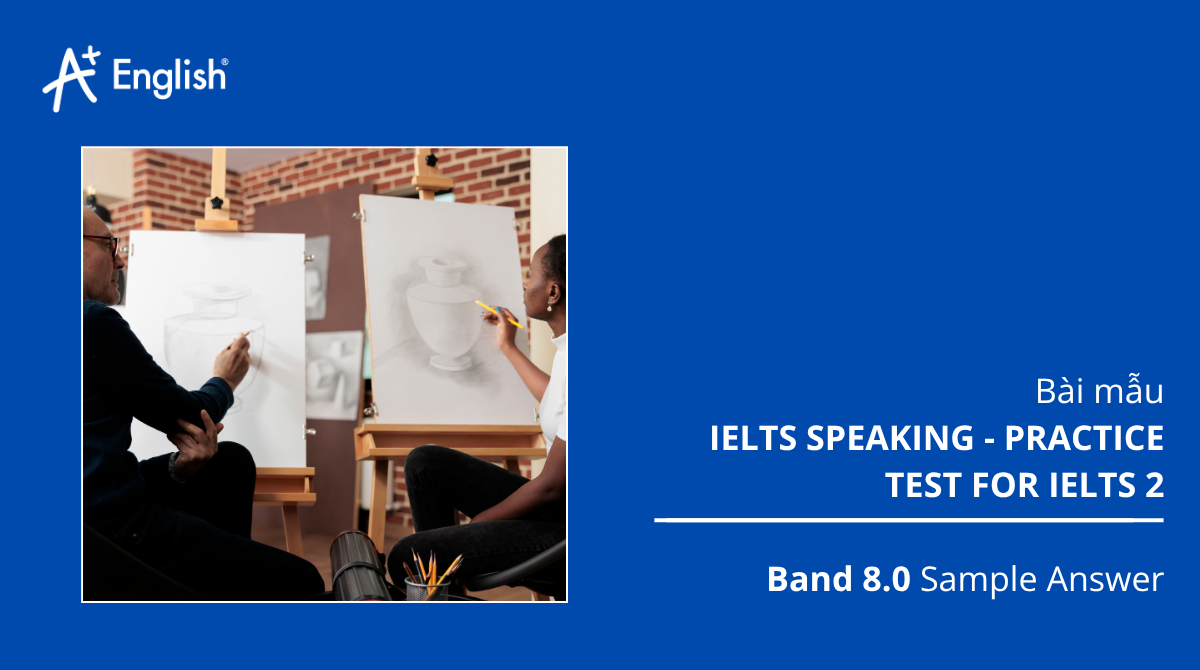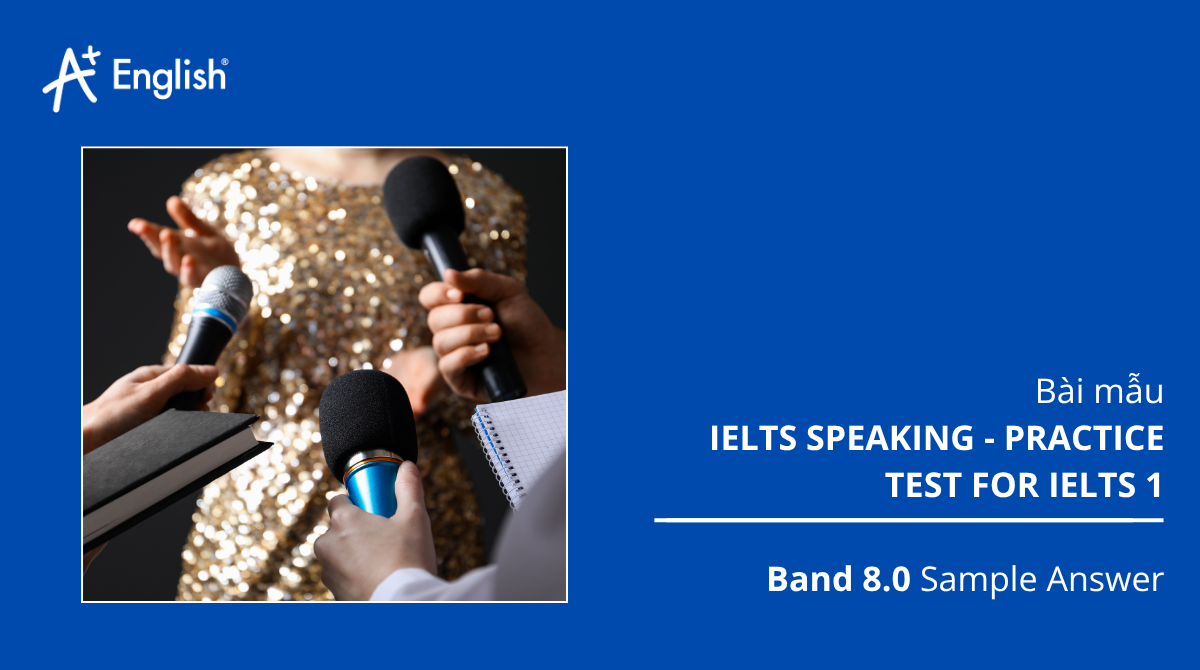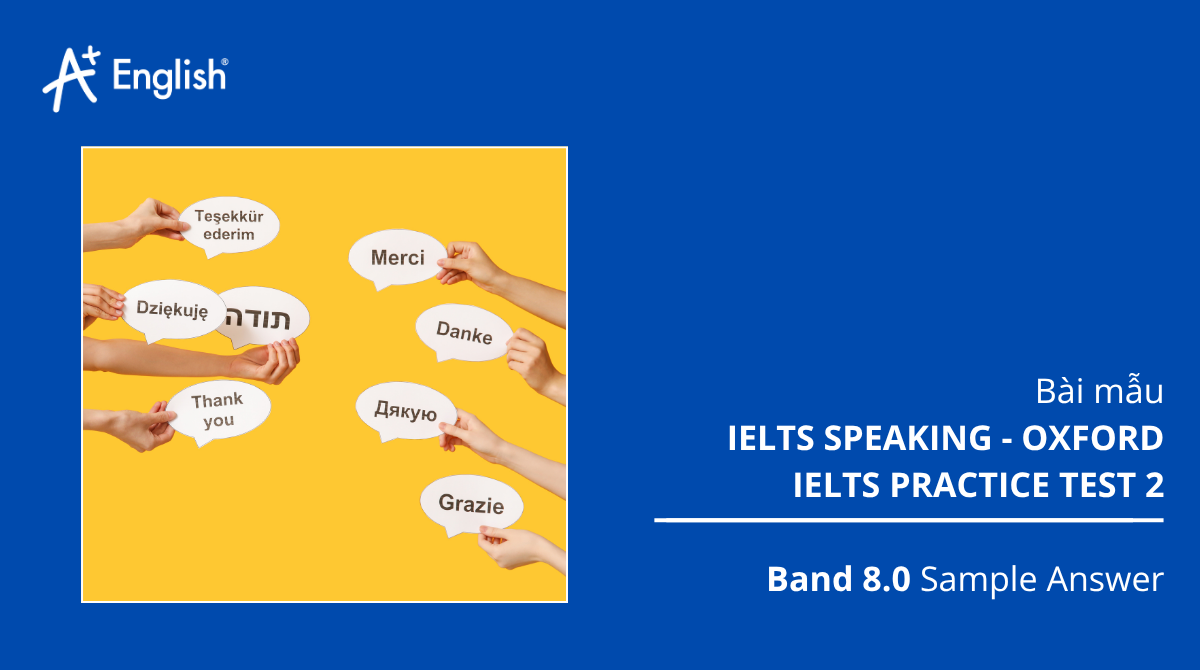A+ English xin giới thiệu đến các bạn bài mẫu IELTS Speaking band 8.0 với những câu trả lời ấn tượng và tự nhiên, giúp thí sinh ghi điểm cao trong kỳ thi.
Bài mẫu không chỉ gợi ý cách triển khai ý tưởng mạch lạc mà còn cung cấp từ vựng phong phú, cấu trúc câu đa dạng và cách diễn đạt tự nhiên, giúp bạn tự tin giao tiếp và thuyết phục giám khảo.
Hãy cùng khám phá ngay để nâng tầm kỹ năng Speaking của bạn nhé!
Nội dung chính
TEST 06: Đề bài Ielts Speaking (Assignment)
| PART 1
The examiner asks the candidate about him/herself, his/her home, work or studies and other familiar topics. Home Let’s talk about where you live.
Bicycles Let’s talk about bicycles.
Foreign languages Let’s talk about foreign languages.
PART 2 Wedding Describe a wedding you have been to or heard about. You should say:
And explain how you felt about this wedding. PART 3 Discussion topics: Special occasions
Dress codes
|
01 Phân tích câu hỏi – Lập dàn ý (Analyze the topic – Outline)
PART 1:
Home
- Do you live in a big house or apartment?
- Main point: I live in an apartment.
- Reason: It’s convenient, easy to clean, and suitable for city life.
- Do you like to have some plants in your home? (Why/Why not?)
- Main point: Yes, I like having plants.
- Reason: They make the home feel fresh and improve air quality.
- What is the most important object that you have in your home? (Why/Why not?)
- Main point: My laptop is the most important.
- Reason: It helps me study, work, and stay entertained.
Bicycles
- Do you often ride a bicycle? (Why/Why not?)
- Main point: No, I don’t ride a bicycle often.
- Reason: I usually use motorbikes because they are faster and more convenient.
- Should all children learn to ride a bicycle? (Why/Why not?)
- Main point: Yes, children should learn to ride.
- Reason: It’s a useful skill that promotes exercise and independence.
- How safe is it to ride a bicycle where you live? (Why/Why not?)
- Main point: It’s not very safe.
- Reason: Traffic is heavy, and there aren’t many bike lanes.
- Is it better to buy a bicycle or to rent one? (Why?)
- Main point: Renting is better.
- Reason: It’s cheaper and more flexible for occasional use.
Foreign Languages
- Do many people in your country learn a foreign language? (Why/Why not?)
- Main point: Yes, English is very popular.
- Reason: It’s important for jobs, travel, and global communication.
- What makes some foreign languages more popular with students than others? (Why?)
- Main point: Languages like English, Chinese, and Japanese are popular.
- Reason: They are widely used in business and entertainment.
- Is there a good way to learn a foreign language? (Why?)
- Main point: Immersive learning is the best way.
- Reason: It helps learners practice listening, speaking, and thinking in the language naturally.
- Do you think children are better language learners than adults? (Why/Why not?)
- Main point: Yes, children learn faster.
- Reason: Their brains are more flexible, and they are less afraid of making mistakes.
PART 2: Describe a wedding you have been to or heard about.
- Who got married? My cousin got married last year.
- What they wore? The bride wore a white gown, and the groom wore a suit.
- What they did on the day? There was a traditional ceremony, a reception party, and speeches from family members.
- How you felt about the wedding? It was joyful and meaningful. It showed how important family and traditions are in Vietnamese culture.
PART 3:
Special Occasions
- What are the most important occasions in someone’s life?
- Main point: Birthdays, weddings, and graduations are the most important.
- Reason: They celebrate milestones and achievements in life.
- In your country, do people usually celebrate special occasions with friends or family?
- Main point: People usually celebrate with family.
- Reason: Family gatherings are seen as a time to strengthen bonds and honor traditions.
- What is unique about celebrations in your country?
- Main point: Vietnamese celebrations often involve food and rituals.
- Reason: For example, Tet (Lunar New Year) includes offering food to ancestors and giving lucky money.
Dress Codes
- Is it important for companies to have strict dress codes for employees?
- Main point: Yes, in certain industries.
- Reason: Dress codes create professionalism and improve first impressions.
- Are there any traditional clothes in your country?
- Main point: Yes, the áo dài is traditional.
- Reason: It’s worn during formal events and represents elegance and culture.
- How might the way we dress change in the future?
- Main point: Clothing may become more casual and technology-focused.
- Reason: People value comfort, and smart fabrics might become more popular.
02 Bài Mẫu (Sample Essay) Band 8.0+
PART 1:Home 1. Do you live in a big house or apartment?I live in an apartment in Ho Chi Minh City. It’s not very big, but it’s cozy and practical for city living. Since it’s close to schools, shops, and parks, it saves me a lot of time traveling. Plus, it’s easy to maintain, which is great because I don’t like cleaning too much. 2. Do you like to have some plants in your home? (Why/Why not?)Yes, I do enjoy having plants at home. They make the space feel more lively and help improve air quality, which is especially important in a busy city like mine. Besides, taking care of plants can be relaxing and adds a bit of nature to my otherwise modern surroundings. 3. What is the most important object that you have in your home? (Why/Why not?)I’d say my laptop is the most important object in my home. It’s not just a tool for studying but also my main source of entertainment. Whether I’m working on assignments, playing games, or watching movies, it’s something I use every single day, so I’d be lost without it. Bicycles 1. Do you often ride a bicycle? (Why/Why not?)Not really—I rarely ride bicycles these days. I usually rely on motorbikes because they’re faster and more convenient, especially when I need to get somewhere quickly. That said, I do think bicycles are a great way to stay fit and eco-friendly, even if I don’t use them much. 2. Should all children learn to ride a bicycle? (Why/Why not?)Yes, I think all children should learn how to ride a bike. It’s an important skill that promotes independence and builds physical strength. Plus, it’s something they can enjoy throughout their lives, whether for fun, exercise, or even transportation. 3. How safe is it to ride a bicycle where you live? (Why/Why not?)To be honest, it’s not very safe. The traffic in Ho Chi Minh City can be chaotic, and there aren’t many bike lanes, so cyclists have to share the road with cars and motorbikes. This makes it risky, especially for beginners or younger riders. 4. Is it better to buy a bicycle or to rent one? (Why?)I think renting is better for people who don’t use bicycles regularly. It’s cheaper, more convenient, and saves space at home. However, if someone rides frequently, buying a bike might be a smarter long-term investment. Foreign Languages 1. Do many people in your country learn a foreign language? (Why/Why not?)Yes, learning foreign languages, especially English, is very common in Vietnam. English is essential for jobs, travel, and studying abroad, so most students start learning it at an early age. Recently, Chinese and Japanese have also gained popularity because of business opportunities. 2. What makes some foreign languages more popular with students than others? (Why?)Languages like English, Chinese, and Japanese are more popular because they’re used in global business, education, and entertainment. Students are also influenced by movies, music, and online content, which makes these languages more appealing to learn. 3. Is there a good way to learn a foreign language? (Why?)In my opinion, immersive learning is the best approach. Watching movies, listening to music, and practicing with native speakers help learners pick up pronunciation and vocabulary naturally. It’s more enjoyable than memorizing grammar rules, and it improves confidence when speaking. 4. Do you think children are better language learners than adults? (Why/Why not?)Yes, I believe children learn languages faster than adults. Their brains are more flexible, so they absorb new information easily. They’re also less afraid of making mistakes, which helps them improve quickly through trial and error. PART 2: Describe a Wedding You Have Been To or Heard AboutI’d like to talk about my cousin’s wedding, which I attended last year. It was a traditional Vietnamese ceremony held in our hometown, and it was a day full of joy and celebration. The bride wore a stunning white áo dài, which is a traditional Vietnamese dress, while the groom looked sharp in a formal suit. The day began with a tea ceremony, where the couple offered tea to their parents and grandparents as a sign of respect. After that, they exchanged vows and rings in front of family and friends. The atmosphere was warm and emotional, especially when the parents gave speeches wishing the couple happiness and success in their new life together. In the evening, there was a big reception party at a hotel. Guests enjoyed a delicious feast, and there was music, dancing, and even a slideshow showing pictures of the couple’s journey. My favorite part was the moment when the couple cut the wedding cake and shared their first dance. I felt really happy and proud to see my cousin start a new chapter in her life. The wedding also made me appreciate Vietnamese traditions more because it highlighted the importance of family and respect for elders. As the saying goes, “Weddings are the beginning of forever,” and this one truly captured that spirit. PART 3:Special Occasions 1. What are the most important occasions in someone’s life?Well, that’s an interesting question—let me take a moment to think about it. Off the top of my head, I’d say the most important occasions in someone’s life are birthdays, weddings, and graduations. These events, if you think about it, mark significant milestones and achievements, symbolizing growth, commitment, and success. For example, birthdays celebrate another year of life, while weddings are all about love and unity. Graduations, on the other hand, highlight achievements that reflect hard work and dedication. People often celebrate these occasions with their loved ones to create lasting memories and show appreciation. As the saying goes, “Life is not measured by the number of breaths we take, but by the moments that take our breath away.” So, at the end of the day, celebrating such events helps make life more meaningful. 2. In your country, do people usually celebrate special occasions with friends or family?Hmm, let me give that some thought. From what I’ve observed, most people in Vietnam prefer celebrating special occasions with family rather than just friends. For example, Tet, which is the Lunar New Year, is all about gathering with relatives, sharing traditional food, and giving lucky money. Weddings are also family-centered, involving ceremonies to honor parents and ancestors. That said, younger generations sometimes celebrate smaller events, like birthdays, with friends at cafes or karaoke bars. Having said that, family still plays a central role in larger celebrations because it’s seen as a time to strengthen bonds and preserve traditions. As the saying goes, “Family is where life begins and love never ends.” 3. What is unique about celebrations in your country?Hmm, let me think about that for a second. One thing that makes Vietnamese celebrations unique is the focus on tradition and symbolism. For instance, during Tet, people decorate their homes with peach blossoms and kumquat trees, which symbolize prosperity and luck. Food also plays a major role—families prepare bánh chưng (sticky rice cakes) to honor their ancestors. Another unique aspect is giving red envelopes filled with money, which represent blessings and good fortune. Weddings are also special, often featuring traditional áo dài and rituals to show respect to parents. These customs, if you ask me, reflect Vietnamese values, such as respect, family unity, and hope for a better future. So, all in all, celebrations here are not just about fun—they carry deep meanings and cultural pride. Dress Codes 1. Is it important for companies to have strict dress codes for employees?Well, that’s an interesting point—let me give it some thought. Personally, I believe strict dress codes are important in certain industries, such as law, banking, and hospitality, where professionalism is key. Wearing formal clothes creates a good impression and shows respect to clients and colleagues. That being said, in more creative fields like technology or design, casual dress codes are often encouraged to promote comfort and creativity. Still, even in relaxed work environments, there’s usually an expectation to look neat and presentable. As the saying goes, “Dress for success,” and a professional appearance can sometimes boost confidence and productivity. So, to my mind, it really depends on the type of work environment. 2. Are there any traditional clothes in your country?Hmm, let me think about that for a second. Yes, Vietnam has traditional clothes, with the áo dài being the most famous one. It’s a long, flowing dress worn over pants and is often customized with embroidery or floral designs. Women typically wear it during weddings, festivals, or important ceremonies because it represents elegance and cultural pride. Men also wear áo dài on formal occasions, although it’s less common nowadays. Despite modern fashion trends, the áo dài remains a symbol of Vietnamese heritage, and it’s still widely admired both locally and internationally. I guess you could say it’s not just a piece of clothing—it’s a representation of our culture and history. 3. How might the way we dress change in the future?Hmm, that’s an interesting thought—let me take a moment to think about it. I think clothing in the future will likely become more casual, comfortable, and technology-focused. People are already prioritizing comfort over formality, so trends like athleisure are gaining popularity. At the same time, we may see smart fabrics with features like temperature regulation or health monitoring becoming more common. Sustainability might also influence fashion, with more eco-friendly materials being used. Having said that, traditional clothes like the áo dài will probably continue to be worn for cultural events. As the saying goes, “Fashion fades, but style is eternal,” so while trends change, some traditions remain timeless. |
| PART 1:
Home 1. Do you live in a big house or apartment? Tôi sống trong một căn hộ ở Thành phố Hồ Chí Minh. Nó không quá lớn, nhưng ấm cúng và phù hợp cho cuộc sống đô thị. Vì gần trường học, cửa hàng và công viên nên nó giúp tôi tiết kiệm nhiều thời gian di chuyển. Thêm vào đó, căn hộ dễ bảo trì, điều này rất tuyệt vì tôi không thích dọn dẹp nhiều. 2. Do you like to have some plants in your home? (Why/Why not?) Có, tôi thích có cây cối trong nhà. Chúng làm cho không gian trở nên sống động hơn và giúp cải thiện chất lượng không khí, điều này đặc biệt quan trọng ở một thành phố bận rộn như của tôi. Ngoài ra, việc chăm sóc cây cối có thể giúp thư giãn và mang lại một chút thiên nhiên vào không gian hiện đại của tôi. 3. What is the most important object that you have in your home? (Why/Why not?) Tôi nghĩ máy tính xách tay là đồ vật quan trọng nhất trong nhà tôi. Nó không chỉ là công cụ học tập mà còn là nguồn giải trí chính của tôi. Cho dù tôi làm bài tập, chơi trò chơi hay xem phim, đây là thứ mà tôi sử dụng hàng ngày, và tôi sẽ cảm thấy lạc lõng nếu không có nó. Bicycles 1. Do you often ride a bicycle? (Why/Why not?) Không hẳn—hiện tại tôi hiếm khi đi xe đạp. Tôi thường dựa vào xe máy vì chúng nhanh hơn và tiện lợi hơn, đặc biệt khi tôi cần đến một nơi nào đó gấp. Mặc dù vậy, tôi vẫn nghĩ xe đạp là một cách tuyệt vời để giữ dáng và thân thiện với môi trường, dù tôi không sử dụng nhiều. 2. Should all children learn to ride a bicycle? (Why/Why not?) Có, tôi nghĩ tất cả trẻ em nên học cách đi xe đạp. Đây là một kỹ năng quan trọng giúp xây dựng tính độc lập và tăng cường thể chất. Hơn nữa, nó là một hoạt động thú vị mà chúng có thể tận hưởng suốt đời, cho dù để giải trí, tập thể dục hay di chuyển. 3. How safe is it to ride a bicycle where you live? (Why/Why not?) Thành thật mà nói, nó không quá an toàn. Giao thông ở Thành phố Hồ Chí Minh khá hỗn loạn, và không có nhiều làn đường dành cho xe đạp, vì vậy người đi xe đạp phải chia sẻ đường với ô tô và xe máy. Điều này làm cho nó trở nên rủi ro, đặc biệt đối với người mới bắt đầu hoặc trẻ em. 4. Is it better to buy a bicycle or to rent one? (Why?) Tôi nghĩ thuê xe đạp sẽ tốt hơn cho những người không sử dụng xe đạp thường xuyên. Nó rẻ hơn, tiện lợi hơn và tiết kiệm không gian trong nhà. Tuy nhiên, nếu ai đó đi xe đạp thường xuyên, mua một chiếc xe đạp có thể là một khoản đầu tư thông minh về lâu dài. Foreign Languages 1. Do many people in your country learn a foreign language? (Why/Why not?) Có, học ngoại ngữ, đặc biệt là tiếng Anh, rất phổ biến ở Việt Nam. Tiếng Anh cần thiết cho công việc, du lịch và du học, vì vậy hầu hết học sinh bắt đầu học từ khi còn nhỏ. Gần đây, tiếng Trung và tiếng Nhật cũng ngày càng phổ biến vì cơ hội kinh doanh. 2. What makes some foreign languages more popular with students than others? (Why?) Những ngôn ngữ như tiếng Anh, tiếng Trung và tiếng Nhật phổ biến hơn vì chúng được sử dụng rộng rãi trong kinh doanh toàn cầu, giáo dục và giải trí. Học sinh cũng bị ảnh hưởng bởi phim ảnh, âm nhạc và nội dung trực tuyến, điều này khiến cho việc học các ngôn ngữ này trở nên hấp dẫn hơn. 3. Is there a good way to learn a foreign language? (Why?) Theo tôi, học nhập tâm là cách tốt nhất. Xem phim, nghe nhạc và luyện tập với người bản ngữ giúp người học nắm bắt cách phát âm và từ vựng một cách tự nhiên. Nó thú vị hơn so với việc học thuộc ngữ pháp và giúp tăng sự tự tin khi nói. 4. Do you think children are better language learners than adults? (Why/Why not?) Có, tôi tin rằng trẻ em học ngôn ngữ nhanh hơn người lớn. Bộ não của chúng linh hoạt hơn nên dễ dàng hấp thụ thông tin mới. Chúng cũng ít sợ mắc lỗi hơn, điều này giúp chúng tiến bộ nhanh chóng thông qua thử nghiệm và sai sót. PART 2: Describe a Wedding You Have Been To or Heard About Tôi muốn kể về đám cưới của chị họ tôi, diễn ra vào năm ngoái. Đó là một lễ cưới truyền thống của Việt Nam được tổ chức ở quê tôi, và đó là một ngày tràn ngập niềm vui và sự hân hoan. Cô dâu mặc một chiếc áo dài trắng tuyệt đẹp, một bộ trang phục truyền thống của Việt Nam, trong khi chú rể trông rất bảnh bao với bộ vest trang trọng. Ngày bắt đầu với nghi thức dâng trà, nơi cặp đôi dâng trà cho cha mẹ và ông bà như một biểu hiện của sự kính trọng. Sau đó, họ trao lời thề và nhẫn trước sự chứng kiến của gia đình và bạn bè. Không khí rất ấm áp và cảm động, đặc biệt là khi cha mẹ phát biểu chúc phúc cho cặp đôi trong cuộc sống mới. Buổi tối, có một bữa tiệc lớn tại khách sạn. Khách mời thưởng thức một bữa tiệc ngon lành, cùng với âm nhạc, khiêu vũ và một đoạn video trình chiếu những hình ảnh về hành trình tình yêu của cặp đôi. Phần yêu thích nhất của tôi là khi họ cắt bánh cưới và nhảy điệu nhảy đầu tiên. Tôi cảm thấy rất vui và tự hào khi thấy chị họ tôi bắt đầu một chương mới trong cuộc đời. Đám cưới cũng làm tôi trân trọng hơn các truyền thống của Việt Nam vì nó nhấn mạnh tầm quan trọng của gia đình và sự kính trọng đối với người lớn tuổi. Như người ta thường nói, “Đám cưới là khởi đầu của một mãi mãi,” và đám cưới này thực sự đã nắm bắt được tinh thần đó. PART 3: Special Occasions 1. What are the most important occasions in someone’s life? Chà, đây là một câu hỏi thú vị—hãy để tôi suy nghĩ một chút. Theo tôi, những dịp quan trọng nhất trong cuộc sống là sinh nhật, đám cưới và lễ tốt nghiệp. Nếu bạn nghĩ về nó, những sự kiện này đánh dấu các cột mốc và thành tựu quan trọng, tượng trưng cho sự trưởng thành, cam kết và thành công. Ví dụ, sinh nhật kỷ niệm thêm một năm tuổi mới, trong khi đám cưới là về tình yêu và sự gắn kết. Mặt khác, lễ tốt nghiệp thể hiện sự nỗ lực và cống hiến trong học tập. Mọi người thường tổ chức những dịp này cùng với những người thân yêu để tạo ra những kỷ niệm đẹp và thể hiện sự trân trọng. Như người ta thường nói, “Cuộc sống không được đo bằng số lần ta thở mà bằng những khoảnh khắc khiến ta nghẹt thở.” Vì vậy, ăn mừng những sự kiện này giúp cuộc sống trở nên ý nghĩa hơn. 2. In your country, do people usually celebrate special occasions with friends or family? Hmm, hãy để tôi suy nghĩ một chút về điều đó. Theo những gì tôi thấy, hầu hết mọi người ở Việt Nam thích tổ chức các dịp đặc biệt với gia đình hơn là chỉ với bạn bè. Ví dụ, Tết Nguyên Đán là dịp để sum họp gia đình, chia sẻ những món ăn truyền thống và trao lì xì may mắn. Đám cưới cũng tập trung vào gia đình, với các nghi thức để tôn vinh cha mẹ và tổ tiên. Tuy nhiên, thế hệ trẻ đôi khi tổ chức các sự kiện nhỏ hơn, như sinh nhật, cùng bạn bè tại quán cà phê hoặc quán karaoke. Mặc dù vậy, gia đình vẫn đóng vai trò trung tâm trong các dịp lớn vì đây là cơ hội để gắn kết và giữ gìn truyền thống. Như người ta thường nói, “Gia đình là nơi cuộc sống bắt đầu và tình yêu không bao giờ kết thúc.” 3. What is unique about celebrations in your country? Hmm, để tôi nghĩ về điều đó trong giây lát. Một điều khiến các lễ kỷ niệm ở Việt Nam trở nên đặc biệt là sự tập trung vào truyền thống và biểu tượng. Ví dụ, trong dịp Tết, mọi người trang trí nhà cửa bằng hoa đào và cây quất, tượng trưng cho sự thịnh vượng và may mắn. Thức ăn cũng đóng vai trò quan trọng—gia đình chuẩn bị bánh chưng để cúng tổ tiên. Một khía cạnh độc đáo khác là việc tặng phong bao lì xì đỏ, biểu thị cho phước lành và sự may mắn. Đám cưới cũng đặc biệt, thường có áo dài truyền thống và các nghi lễ thể hiện sự tôn trọng đối với cha mẹ. Những phong tục này, theo tôi, phản ánh các giá trị của người Việt Nam, như sự tôn kính, đoàn kết gia đình và hy vọng cho tương lai tốt đẹp hơn. Tóm lại, các lễ kỷ niệm ở đây không chỉ là vui vẻ mà còn mang ý nghĩa sâu sắc và niềm tự hào văn hóa. Dress Codes 1. Is it important for companies to have strict dress codes for employees? Hmm, đó là một điểm thú vị—hãy để tôi suy nghĩ về điều đó một chút. Cá nhân tôi nghĩ rằng quy tắc ăn mặc nghiêm ngặt rất quan trọng trong một số ngành nghề nhất định, như luật, ngân hàng và khách sạn, nơi mà sự chuyên nghiệp là yếu tố then chốt. Việc mặc trang phục chỉnh tề tạo ấn tượng tốt và thể hiện sự tôn trọng đối với khách hàng và đồng nghiệp. Tuy nhiên, trong các ngành sáng tạo như công nghệ hoặc thiết kế, quy tắc ăn mặc thoải mái thường được khuyến khích để thúc đẩy sự thoải mái và sáng tạo. Dù vậy, ngay cả trong môi trường làm việc thư giãn, người ta vẫn mong đợi sự gọn gàng và lịch sự. Như người ta nói, “Hãy mặc đẹp để thành công,” và vẻ ngoài chuyên nghiệp đôi khi có thể giúp tăng sự tự tin và năng suất. 2. Are there any traditional clothes in your country? Hmm, để tôi suy nghĩ về điều đó trong giây lát. Có, Việt Nam có trang phục truyền thống, nổi bật nhất là áo dài. Đây là chiếc váy dài thướt tha mặc kèm với quần, thường được trang trí bằng hoa văn hoặc thêu tay. Phụ nữ thường mặc áo dài trong đám cưới, lễ hội hoặc các sự kiện quan trọng vì nó thể hiện sự thanh lịch và niềm tự hào văn hóa. Nam giới cũng mặc áo dài trong những dịp trang trọng, mặc dù điều này ít phổ biến hơn ngày nay. Bất chấp sự thay đổi của xu hướng thời trang hiện đại, áo dài vẫn là biểu tượng của di sản Việt Nam và được ngưỡng mộ rộng rãi cả trong nước và quốc tế. Tôi nghĩ bạn có thể nói rằng nó không chỉ là trang phục mà còn là đại diện cho văn hóa và lịch sử của chúng tôi. 3. How might the way we dress change in the future? Hmm, đó là một suy nghĩ thú vị—hãy để tôi suy nghĩ một chút. Tôi nghĩ rằng quần áo trong tương lai có thể trở nên thoải mái, giản dị và tập trung vào công nghệ hơn. Mọi người đã ưu tiên sự thoải mái hơn sự trang trọng, vì vậy các xu hướng như thời trang thể thao đang ngày càng phổ biến. Đồng thời, chúng ta có thể thấy các loại vải thông minh với tính năng điều chỉnh nhiệt độ hoặc theo dõi sức khỏe trở nên phổ biến hơn. Tính bền vững cũng có thể ảnh hưởng đến thời trang, với việc sử dụng nhiều vật liệu thân thiện với môi trường hơn. Tuy nhiên, quần áo truyền thống như áo dài có lẽ vẫn sẽ được mặc trong các sự kiện văn hóa. Như người ta nói, “Thời trang phai nhạt, nhưng phong cách là vĩnh cửu,” vì vậy dù xu hướng có thay đổi, một số truyền thống vẫn sẽ tồn tại mãi mãi. |
03 Từ vựng (Vocabulary)
- Milestone /ˈmaɪl.stəʊn/ – C1 – Noun – Cột mốc quan trọng.
- Collocations:
-
- Significant milestone – Cột mốc quan trọng.
- Mark a milestone – Đánh dấu một cột mốc.
- Ví dụ: These events mark significant milestones and achievements.
- Dịch: Những sự kiện này đánh dấu các cột mốc và thành tựu quan trọng.
- Prosperity /prɒsˈper.ə.ti/ – C1 – Noun – Sự thịnh vượng.
- Collocations:
-
- Symbol of prosperity – Biểu tượng của sự thịnh vượng.
- Economic prosperity – Sự thịnh vượng kinh tế.
- Ví dụ: People decorate their homes with peach blossoms and kumquat trees, which symbolize prosperity and luck.
- Dịch: Mọi người trang trí nhà cửa bằng hoa đào và cây quất, tượng trưng cho sự thịnh vượng và may mắn.
- Independence /ˌɪn.dɪˈpen.dəns/ – B2 – Noun – Sự độc lập
- Collocations:
-
- Financial independence – Độc lập tài chính
- Gain independence – Đạt được sự tự lập
- Ví dụ: Learning to ride a bicycle promotes independence and builds physical strength.
- Dịch: Học cách đi xe đạp thúc đẩy sự độc lập và tăng cường sức khỏe thể chất.
- Convenient /kənˈviː.ni.ənt/ – B2 – Adjective – Thuận tiện
- Collocations:
-
- Highly convenient – Cực kỳ thuận tiện
- Convenient location – Vị trí thuận tiện
- Ví dụ: Renting a bicycle is more convenient for people who don’t ride regularly.
- Dịch: Việc thuê xe đạp thuận tiện hơn cho những người không đi xe thường xuyên.
- Immersive /ɪˈmɜː.sɪv/ – C1 – Adjective – Tính đắm chìm, hòa nhập
- Collocations:
-
- Immersive learning – Học tập qua trải nghiệm thực tế
- Immersive experience – Trải nghiệm đắm chìm
- Ví dụ: Immersive learning methods, like watching movies or speaking with native speakers, help learners develop language skills quickly.
- Dịch: Phương pháp học tập đắm chìm, như xem phim hoặc nói chuyện với người bản ngữ, giúp người học phát triển kỹ năng ngôn ngữ nhanh chóng.
- Achievement /əˈtʃiːv.mənt/ – B2 – Noun – Thành tựu
- Collocations:
-
- Academic achievement – Thành tích học tập
- Celebrate achievements – Chúc mừng những thành tựu
- Ví dụ: Graduations highlight achievements that reflect hard work and dedication.
- Dịch: Lễ tốt nghiệp nhấn mạnh các thành tựu thể hiện sự nỗ lực và cống hiến.
- Symbolize /ˈsɪm.bə.laɪz/ – C1 – Verb – Tượng trưng, biểu tượng
- Collocations:
-
- Symbolize unity – Tượng trưng cho sự đoàn kết
- Symbolize tradition – Tượng trưng cho truyền thống
- Ví dụ: Peach blossoms symbolize prosperity and luck during Tet.
- Dịch: Hoa đào tượng trưng cho sự thịnh vượng và may mắn trong dịp Tết.
- Dedication /ˌded.ɪˈkeɪ.ʃən/ – C1 – Noun – Sự cống hiến
- Collocations:
-
- Professional dedication – Sự cống hiến chuyên nghiệp
- Hard work and dedication – Làm việc chăm chỉ và cống hiến
- Ví dụ: Success often reflects hard work and dedication.
- Dịch: Thành công thường phản ánh sự chăm chỉ và cống hiến.
- Heritage /ˈher.ɪ.tɪdʒ/ – C2 – Noun – Di sản
- Collocations:
-
- Cultural heritage – Di sản văn hóa
- Preserve heritage – Bảo tồn di sản
- Ví dụ: The áo dài remains a symbol of Vietnamese heritage and culture.
- Dịch: Áo dài vẫn là biểu tượng của di sản và văn hóa Việt Nam.
- Sustainability /səˌsteɪ.nəˈbɪl.ə.ti/ – C2 – Noun – Tính bền vững
- Collocations:
-
- Environmental sustainability – Sự bền vững về môi trường
- Promote sustainability – Thúc đẩy tính bền vững
- Ví dụ: Eco-friendly materials promote sustainability in fashion.
- Dịch: Các vật liệu thân thiện với môi trường thúc đẩy tính bền vững trong thời trang.
Thành ngữ (Idioms)
- Life is not measured by the number of breaths we take, but by the moments that take our breath away – Cuộc sống không được đo bằng số nhịp thở, mà bằng những khoảnh khắc khiến ta ngạt thở vì hạnh phúc.
- Ví dụ: Celebrating important milestones reminds us that life is not measured by the number of breaths we take, but by the moments that take our breath away.
- Dịch: Việc kỷ niệm những dấu mốc quan trọng nhắc nhở chúng ta rằng cuộc sống không được đo bằng số nhịp thở, mà bằng những khoảnh khắc khiến ta ngạt thở vì hạnh phúc.
- Family is where life begins and love never ends – Gia đình là nơi cuộc sống bắt đầu và tình yêu không bao giờ kết thúc.
- Ví dụ: Vietnamese celebrations, especially weddings and Tet, highlight the idea that family is where life begins and love never ends.
- Dịch: Các dịp lễ hội của người Việt, đặc biệt là đám cưới và Tết, làm nổi bật ý nghĩa rằng gia đình là nơi cuộc sống bắt đầu và tình yêu không bao giờ kết thúc.
- Dress for success – Ăn mặc để thành công.
- Ví dụ: In industries like banking and law, employees are often told to dress for success to make a professional impression.
- Dịch: Trong các ngành như ngân hàng và luật, nhân viên thường được khuyên ăn mặc để thành công nhằm tạo ấn tượng chuyên nghiệp.
- Fashion fades, but style is eternal – Thời trang thay đổi, nhưng phong cách là vĩnh cửu.
- Ví dụ: Even though modern trends keep evolving, the áo dài remains popular because, as they say, fashion fades, but style is eternal.
- Dịch: Mặc dù các xu hướng hiện đại liên tục thay đổi, áo dài vẫn phổ biến vì như người ta nói, thời trang thay đổi, nhưng phong cách là vĩnh cửu.
- Weddings are the beginning of forever – Đám cưới là khởi đầu của sự vĩnh cửu.
- Ví dụ: At my cousin’s wedding, the emotional speeches and ceremonies truly reflected that weddings are the beginning of forever.
- Dịch: Tại đám cưới của anh họ tôi, những bài phát biểu đầy cảm xúc và nghi lễ thực sự thể hiện rằng đám cưới là khởi đầu của sự vĩnh cửu.
04 Ngữ pháp
- Present Continuous Tense
- Công thức chung: S + am/is/are + V-ing
- Nghĩa tiếng Việt: Thì hiện tại tiếp diễn – diễn tả hành động đang diễn ra tại thời điểm nói hoặc trong tương lai gần.
- Bối cảnh sử dụng: Miêu tả xu hướng hoặc hành động đang diễn ra.
- Ví dụ: People are already prioritizing comfort over formality.
- Dịch: Mọi người hiện đang ưu tiên sự thoải mái hơn là sự trang trọng.
- Modal Verbs (Necessity)
- Công thức chung: S + should/ought to + V(bare infinitive)
- Nghĩa tiếng Việt: Động từ khiếm khuyết thể hiện sự cần thiết hoặc khuyến nghị.
- Bối cảnh sử dụng: Đưa ra lời khuyên hoặc quan điểm.
- Ví dụ: I think all children should learn how to ride a bike.
- Dịch: Tôi nghĩ tất cả trẻ em nên học cách đi xe đạp.
- Subordinating Conjunctions
- Công thức chung: Main clause + subordinating conjunction + dependent clause
- Nghĩa tiếng Việt: Từ nối chỉ sự phụ thuộc giữa hai mệnh đề.
- Bối cảnh sử dụng: Giải thích lý do hoặc điều kiện bổ sung.
- Ví dụ: Since it’s close to schools, shops, and parks, it saves me a lot of time traveling.
- Dịch: Vì nó gần trường học, cửa hàng và công viên nên tôi tiết kiệm được nhiều thời gian di chuyển.
- Conditional Sentences (Type 1)
- Công thức chung: If + S + V (present simple), S + will/can/might + V(bare infinitive)
- Nghĩa tiếng Việt: Câu điều kiện loại 1 – diễn tả điều kiện có thể xảy ra trong tương lai.
- Bối cảnh sử dụng: Đề cập đến khả năng hoặc hệ quả dự đoán được.
- Ví dụ: If someone rides frequently, buying a bike might be a smarter long-term investment.
- Dịch: Nếu ai đó đạp xe thường xuyên, mua một chiếc xe đạp có thể là khoản đầu tư thông minh về lâu dài.
- Parallel Structures
- Công thức chung: S + V + (noun/adjective/phrase) + and + (noun/adjective/phrase)
- Nghĩa tiếng Việt: Cấu trúc song song để liệt kê ý tưởng hoặc hành động liên quan.
- Bối cảnh sử dụng: Liệt kê nhiều khía cạnh hoặc đặc điểm một cách cân đối.
- Ví dụ: Guests enjoyed a delicious feast, and there was music, dancing, and even a slideshow showing pictures of the couple’s journey.
- Dịch: Khách mời đã thưởng thức một bữa tiệc ngon miệng, có âm nhạc, khiêu vũ và thậm chí là trình chiếu hình ảnh về hành trình của cặp đôi.
05 Các hình thái thể hiện sự lưu loát
- Sử dụng từ nối và liên từ (Cohesive Devices)
- “That said…” – Tương phản
- Giải thích: Đưa ra ý kiến bổ sung hoặc điều chỉnh sau khi nêu một quan điểm.
- “For example…” – Minh họa
- Giải thích: Cung cấp ví dụ cụ thể để làm rõ ý tưởng.
- “On the other hand…” – So sánh/Đối lập
- Giải thích: Chỉ ra một quan điểm khác biệt để cân nhắc hoặc làm nổi bật sự đối lập.
- “At the end of the day…” – Tổng kết/Kết luận
- Giải thích: Nhấn mạnh ý chính hoặc đưa ra kết luận cuối cùng để kết thúc bài nói.
- “Having said that…” – Chuyển ý
- Giải thích: Giúp chuyển từ một quan điểm sang một góc nhìn khác một cách tự nhiên và logic.
- Ngữ điệu và phong cách hội thoại (Spoken Features)
- Cụm từ diễn đạt để lấy thời gian suy nghĩ:
- “Hmm, let me give that some thought.”
- “Well, that’s an interesting question—let me take a moment to think about it.”
- “Off the top of my head…”
- Ngắt câu và nhấn mạnh thông tin chính:
- Ví dụ: “So, at the end of the day, celebrating such events helps make life more meaningful.”
- Nhấn mạnh trước khi kết luận để giúp thông tin nổi bật hơn.
06 Phát âm
- Từ và cụm từ nhấn mạnh (Emphasis and Stress)
- Nhấn mạnh từ khóa: “Absolutely essential.” → Nhấn mạnh bằng cách kéo dài và nhấn giọng từ “absolutely.”
- Tăng mức độ cảm xúc: “Really meaningful.” → Nhấn mạnh từ “really” để tạo cảm xúc mạnh mẽ.
- Kết nối âm (Linking Sounds)
- Nối âm tự nhiên (Elision): “I’d like to talk about…” → Âm cuối của “I’d” nối với “like.”
- Giảm âm khi nói nhanh: “Kind of important.” → Âm “d” trong “kind” biến mất khi nói nhanh.
- Nhịp điệu và tốc độ nói (Rhythm and Timing)
- Thay đổi tốc độ để nhấn mạnh: “As the saying goes, ‘Family is where life begins and love never ends.’”
- Tốc độ chậm hơn để nhấn mạnh phần trích dẫn.
07 Bài luyện tập (Practice Exercise)
Bài tập dịch từ tiếng Việt qua tiếng Anh:
Bài tập viết lại câu: People prioritize sustainability over profit nowadays. (Present Continuous Tense) It is important to maintain traditions during celebrations. (Modal Verbs – Necessity) We decided to rent a bike. The weather was perfect for cycling. (Subordinating Conjunctions) You need to study hard. Then you will pass the exam. (Conditional Sentences – Type 1) The ceremony included speeches, traditional music, and dances. (Parallel Structures) |
KEYBài tập dịch từ tiếng Việt qua tiếng Anh:
Bài tập viết lại câu:
|
Sau khi tham khảo bài mẫu IELTS Speaking – Band 8.0, A+ English hy vọng các bạn sẽ hiểu rõ cách triển khai câu trả lời, phát triển ý tưởng mạch lạc. Đồng thời, các bạn cũng sẽ thu thập thêm nhiều từ vựng, cấu trúc hay và cách diễn đạt tự nhiên để áp dụng trong kỳ thi.
Nếu bạn đang tìm một khóa học IELTS chất lượng cao, phù hợp với trình độ của mình, hãy liên hệ ngay Tại đây để được tư vấn lộ trình học cá nhân hóa và nhận những tài liệu độc quyền mới nhất!
A+ English chúc các bạn học tập hiệu quả!






